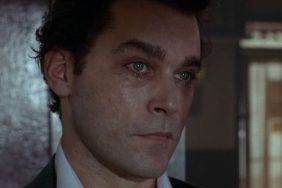
When you think of the greatest filmmakers working today, you probably think of the old standby’s, like Martin Scorsese or Steven Spielberg. But some of us – the cool ones – also think of filmmakers like David Cronenberg, who has been putting his unique artistic stamp on horror movies, sci-fi films and serious dramas since the 1970s, pumping out critically acclaimed classics and cult masterpieces in equal measure.
With David Cronenberg’s last films, Maps to the Stars, emerging at theaters this weekend, we wanted to celebrate by tasking our three film critics – William Bibbiani, Witney Seibold and Brian Formo – with the challenge of singling out one film that, in their eyes, qualifies as The Best David Cronenberg Movie Ever. They each picked different films this week, and you can find out what they picked and why by scrolling below, and finally vote for your own favorites at the bottom of the page.
Come back next Wednesday for another highly debatable installment of CraveOnline’s The Best Movie Ever!
Check Out: David Cronenberg on Film Critics and the Conundrum of Fame (Exclusive Interview)
Witney Seibold’s Pick: Videodrome (1983)

David Cronenberg is often called the master of body horror, thanks to movies like The Fly, Rabid, Dead Ringers, Crash, and eXistenZ, which all feature graphic depictions of bodily mutilation, scarification, and outright mutation. He deals a lot with orifices, fluids, and disease. But a brief moment of analysis reveals that Cronenberg’s metier is far more sophisticated than mere visceral thrill. Cronenberg is interested in the conflict between a body’s base functionality and the mind’s intellectual requirements. Often, the mind can move so far in one direction, that the body ends up getting lost in the mix. This is the man who revealed that the mind could reach into another mind and make it explode (Scanners). Sexual desire (or the repression thereof) can lead to extreme violence or crippling discontentment (A Dangerous Method, Spider, others). And once the body is mutated, all of reality begins to unravel. Madness is the logical conclusion of Cronenberg’s movies, and, if taken to a logical extreme, madness may be the mind’s default state.
In this media-saturated age of infinite screens, Cronenberg’s best and most relevant movie is his 1983 commentary Videodrome. James Woods plays Max, a TV pirate who broadcasts violent, smutty movies into the ether without any regulation. In his piracy, he stumbles upon a super-violent channel that depicts nothing but sexual torture. Soon thereafter, he begins experiencing bizarre hallucinations. It is eventually explained that certain minds – the ones that hunger for sex and violence through TV screens – are susceptible to a hidden carrier wave that drives them mad, and allows them to join an underground terrorist group of anti-media terrorists.
Videodrome taps into so many salient and brilliant points about the role mass media plays in modern society. It’s intellectual, but is determined to show the limits of the intellect. The characters all talk like Marshall McLuhan, but behave like space aliens. Everyone is deeply interested in violent sex (Deborah Harry burns her own breast with a cigarette), but you can’t tell if its a genuine interest in libido, a hypnotic impulse dictated by a puppet master, or a defiant rejection of the “real.” Reality is warped, blurred by the media we consume. Our minds are indeed effected by the cathode ray tube, the “retina of the mind’s eye,” as mogul Brian O’Blivion dictates. In a modern world where we consume more media than reality, Videodrome is perhaps the most important essay for the age.
Check Out: The Best Movie Ever: Oscar Snubs
William Bibbiani’s Pick: The Fly (1986)

David Cronenberg is, no fooling, my favorite living director. While I may not love every single one of his motion pictures (Scanners leaves me a bit cold, and Eastern Promises suffers from “useless protagonist” syndrome), there is always something fascinating going on within them. Unique ideas, bizarre imagery and challenging themes that few other filmmakers seem interested in touching, let alone elevating into high art.
And while Dead Ringers is arguably his most beautiful work, and Videodrome is perhaps his most bold cinematic statement, I would argue that his prototypical film – the one that perfectly represents what Cronenberg is truly capable of – is also his most popular. The Fly is a masterpiece of horror, science fiction and human drama. Based on an already worthy 1958 sci-fi flick – about a scientist who accidentally mixes his DNA with that of a common housefly – Cronenberg’s version handily trumps the original in terms of visual effects wizardry and grisly insight.
Because The Fly could have been a standard creature feature, and yet in David Cronenberg’s mind it’s actually a bitter tragedy about degenerative illness. Take your pick, whichever one terrifies you the most, that’s what Seth Brundle (Jeff Goldblum, never better) suffers from. The alienation he feels, the shame, the unexpected sense of pride and finally the terror that his condition might be passed on to his unborn child are disturbingly honest emotional responses to his creeping, ugly fate. Even the gore effects, as good as any ever filmed, only serve to highlight just how treacherous the human body can be once it decides to work against you. It’s a tearjerking, ultraviolent and hyper-intelligent triumph. Although the competition is stiff, I’d argue that it’s the best David Cronenberg movie ever.
Check Out: The Best Movie Ever: Musicals
Brian Formo’s Pick: Crash (1996)

David Cronenberg has always ben associated with body horror—gruesome things happening to the body, creating craters, and massive wounds—but really he’s transformer horror. The new flesh in Videodrome is a fleshy fusion with technology. eXistenZ is the slightly safer, game version, where you plug into an alternate reality through your spine. The Fly is a human fusion with one of the most detested species on earth: the housefly. Even A History of Violence is a transformative narrative: can you ever remove the impulse to kill?








